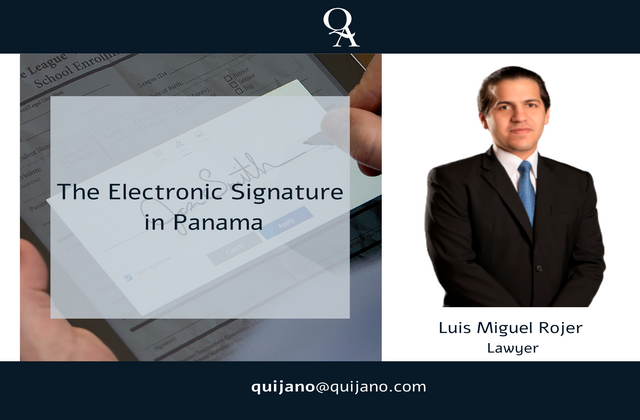The Electronic Signature in Panama

- The Electronic Signature in Panama
The electronic signature in Panama has been regulated for more than 10 years through (i) Law No. 51 of July 22, 2008, which defines and regulates electronic documents and signatures and the provision of technological storage services of documents and certification of electronic signatures and adopts other provisions for the development of electronic commerce; (ii) Law No. 82 of November 9, 2012. Which grants the Public Registry of Panama powers as electronic signature root registrar and certifying authority for the Republic of Panama, amends Law 51 of 2008 and adopts other provisions; and (iii) Executive Decree No. 684 of October 18, 2013 Which regulates Law 51 of 2008 and Law 82 of 2012.
In Panama, the Public Registry of Panama, through the National Directorate of Electronic Signature, is empowered with the responsibility of managing electronic certificates for the Republic of Panama. This agency was created for the development, inspection and oversight of the provision of certification services for electronic signatures and other services included in the activity of certification service providers as defined by Law No. 51 of 2008.
Among the most important functions performed by the National Directorate of Electronic Signature are:
- Administrative and technical advice regarding electronic signature.
- Management of electronic certificates
- To dictate and issue the regulations, resolutions and technical documents on matters within its competence.
- To implement and execute the National Program of Electronic Signature in the Republic of Panama.
- To Perform the function of registration of Certification Service Providers.
- To dictate and issue regulations, resolutions and technical documents on matters within its competence.
- To ensure the permanent and uninterrupted rendering of electronic signature service nationwide.
How is the electronic signature known?
2. Simple Electronic Signature
Technical method to identify a person and to indicate that person’s approval of the information contained in a data message or electronic document.
Examples:
- Identifying and verifying a person’s identity through a username and password.
- to sign with an electronic pen or finger on a tablet or cell phone to collect the signature.
- Giving consent by accepting a check box.
3. Qualified Electronic Signature
The Electronic Signature is a technological solution that is added to a cryptographic device, which allows to give legal value to the documents and electronic transactions, protecting the integrity of the data, authenticating the signatories, and guaranteeing the non-repudiation of its authors.
Electronic signature whose validity is supported by a qualified electronic certificate:
- Allows the signer to be identified and any subsequent changes to the signed data to be detected.
- Is uniquely linked to the signatory and to the data to which it refers.
- Has been created using secure creation devices and through the infrastructure of a certification service provider.
4. Electronic Certificates
The electronic certificate: is an electronic document issued by an electronic signature service provider that links the verification data of an electronic signature of a signatory and confirms its identity.
The Qualified Electronic Certificate: is the electronic certificate issued by the Public Registry or by a service provider that meets the requirements established for the verification of the identity of the signatories, reliability and guarantees of the services.
The Electronic Certificates are extinguished by the expiration of the period of validity; revocation of the validity; and cessation of operations of the service provider.
Qualified electronic certificates shall contain at least the following information:
- Identification of the signatory
- Name of the Service Provider
- Date of issuance and expiration of the certificate
- Serial or identification number
- Signature of service provider
- Signature verification data
5. Legal value of electronic documents
The validity, legal effects and binding force of acts, powers of attorney and contracts and any document that has been granted or received by means of a data message is recognized, provided that the information contained therein is accessible for subsequent consultation. And they shall be admissible as evidence with the same probative force.
When the law requires that the information be presented and preserved in its original form, this requirement shall be satisfied if:
- There is a reliable guarantee that the integrity of the information has been preserved.
- That the information can be shown to the person to whom it is to be presented.
The electronic signature will have legal value when the law requires the signature of a person or establishes consequences for the absence of the signature, such requirement of signature will be satisfied with a data message if:
- Whether a method has been used to identify the originator of a data message and to indicate that the content has been approved by the originator.
- The method is reliable and appropriate for the purpose for which the message was generated.
- The above requirements shall be deemed satisfied when both are present but shall be presumed to be met by right in the event there is a qualified electronic signature and therefore a certification service provider authorized by the National Directorate Electronic Signature is involved in the issuance.
6. Qualification Service Providers
It is the legal entity that issues electronic signatures and electronic certificates to identify the owner and the status of such signatures.
Pursuant to the provisions of the regulations, any natural or legal person, national or foreign, that offers the certification service of qualified electronic signatures to third parties must register with the National Directorate of Electronic Signatures. In order to apply for registration, the certification service provider must pay a fee to the National Directorate of Electronic Signature. Once all the requirements are fulfilled, the certification service provider shall be registered in a registry kept by the National Directorate of Electronic Signature, which shall be of a public nature. The certification service provider shall have the obligation to inform the National Directorate of Electronic Signature of any modification of the conditions that allowed its registration.
7. Application for Electronic Signature
- You must enter the web page, and complete the appointment request form;
- You must provide the following personal and profile data:
- Personal data: Full name, ID, e-mail and Date of birth.
- Profile data:Business name, Taxpayer Code Number
- The Legal Representative will be the only one who may request the electronic signature, he/she must present his/her ID Card and the certificate of the Public Registry to validate his/her capacity to act on behalf of the legal entity.
- The applicant’s biometric data is registered and the cryptographic device is issued, followed by the electronic certificate.
8. Benefits of the Electronic Signature
- Legal certainty of electronic transactions and documents; same value as the handwritten signature.
- Improved competitiveness of the country.
- Greater transparency in public management.
- Savings for the Government and citizens.
- Provides a guarantee for customers.




